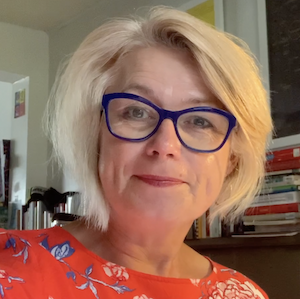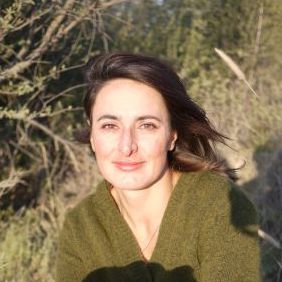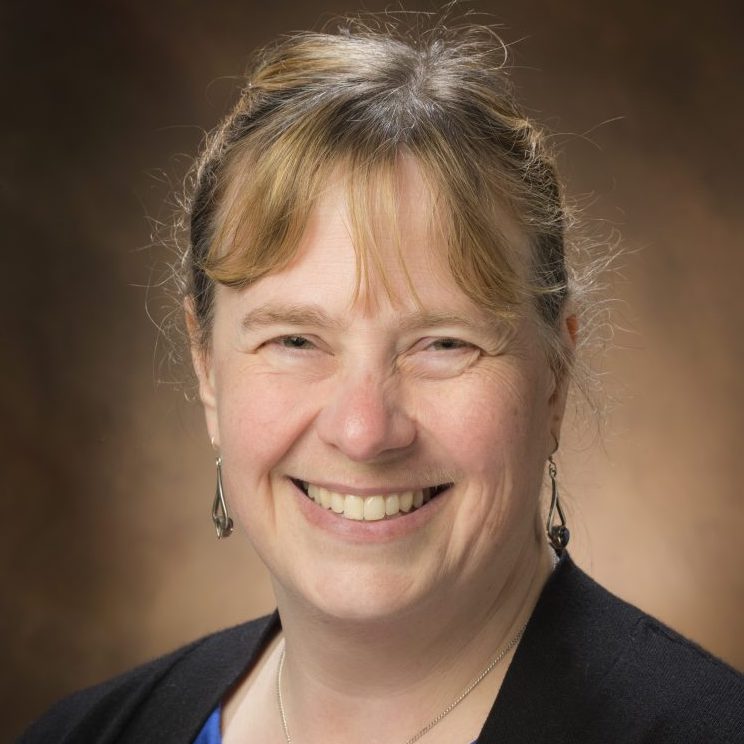As part of our 20th anniversary celebrations, we've checked in with former fellows to gather reflections on their fellowship years, to get an update on their fellowship projects, and to see what they are working on next. Read them all here.
 2006–2007 faculty fellow Anke Finger is professor of German, Media Studies, and Comparative Literary and Cultural Studies in the department of Literatures, Cultures, and Languages at UConn. A co-founder and co-editor (2005–2015) of the multilingual, peer reviewed, open access journal Flusser Studies, Anke Finger’s closely related scholarship in media studies originates from her work on the Czech-Brazilian philosopher Vilém Flusser. She co-authored the 2011 Introduction to Vilém Flusser, and she is a member of the Flusser project team at Greenhouse Studios. She edited Flusser’s The Freedom of the Migrant and co-edited the collection KulturConfusão: On German-Brazilian Interculturalities (2015). From 2016 to 2019 Anke Finger served as the inaugural director of the Digital Humanities and Media Studies Initiative at the Humanities Institute; she also co-founded the CTDH network. Together with Christoph Ernst (University of Bonn), she organized a symposium on “Radical Futures” in March 20–21, 2021. All presentations are available on youtube.
2006–2007 faculty fellow Anke Finger is professor of German, Media Studies, and Comparative Literary and Cultural Studies in the department of Literatures, Cultures, and Languages at UConn. A co-founder and co-editor (2005–2015) of the multilingual, peer reviewed, open access journal Flusser Studies, Anke Finger’s closely related scholarship in media studies originates from her work on the Czech-Brazilian philosopher Vilém Flusser. She co-authored the 2011 Introduction to Vilém Flusser, and she is a member of the Flusser project team at Greenhouse Studios. She edited Flusser’s The Freedom of the Migrant and co-edited the collection KulturConfusão: On German-Brazilian Interculturalities (2015). From 2016 to 2019 Anke Finger served as the inaugural director of the Digital Humanities and Media Studies Initiative at the Humanities Institute; she also co-founded the CTDH network. Together with Christoph Ernst (University of Bonn), she organized a symposium on “Radical Futures” in March 20–21, 2021. All presentations are available on youtube.
What was your fellowship project about?
Initially, my fellowship project was to be a book about my own family, a case study of former East Germany from an everyday perspective that included education, family dynamics, and politics, focused on my father’s escape via the Baltic Sea in 1974. Turns out that family dynamics were ongoing. It was difficult gathering data and materials, and it became this rather endless tunnel of new discoveries that required constant re-evaluation. To not lose sight of my time at the UCHI, I worked on two other books, The Aesthetics of the Total Artwork (The Johns Hopkins University Press) and the co-authored introduction to Vilém Flusser (University of Minnesota Press) that came out at the same time. The first is a collection of essays about the idea of intersecting art disciplines within modernism and moving well into contemporary art; the second is the first guide to the multilingual, multidisciplinary work of the communication philosopher Vilém Flusser (1920–1991) that has generated a great many studies on his international oeuvre.
Would you give us an update on the project?
The research about my family, including interviews and archival work, is only now finished so that I can write Memoryland during my sabbatical. Frankly, the timing, 60 years after the building of the Berlin Wall, 30 years after reunification, is better today for a number of reasons. The other books have been followed by another Flusser project that is just coming out with the University of Minnesota Press, What If? Twenty-Two Scenarios in Search of Images (2022), and I continue to publish on the idea of the total artwork—I guess the topic just keeps holding my passions and interest.
How did your fellowship year shape your project, or shape your scholarship in general?
It was the very first occasion I ever had this much time to dedicate to my work. At first, I was a bit paralyzed, I suppose: what to do? A plethora of options. But once I realized I was not able to produce what I had planned I fell into a rhythm and went with the flow. The year certainly shaped my scholarship in that I learned to take a phenomenological approach to my projects and have worked like that ever since: always have several projects in different stages of production since they all need their own time, perspective, and attention.
Would you share a favorite memory from your time as a UCHI fellow?
One of the delights of being an early UCHI fellow was the relatively tight quarters in Austin that just made you hang out quite a bit. I remember conversations standing in door frames with my fellow fellows, Michael Lynch and Mark Overmeyer-Velasquez or Robin Greeley, just shooting the breeze and enjoying a cup of coffee we brewed at the end of the hallway. It was intimate and relaxed at the same time.
What are you working on now (or next)?
I am currently promoting or publishing four books, the aforementioned What If? by Vilém Flusser (I introduced, edited and translated the work); a just-out collection on The Digital Dissertation: Knowledge Production in the Arts and Humanities (Open Book Publishers, 2021), with Virginia Kuhn; a collection on Women in German Expressionism: Gender, Sexuality, Activism (University of Michigan Press, 2022), with Julie Shoults; and a collection on Bias, Belief, and Conviction in an Age of Fake Facts (Routledge, 2022), with Manuela Wagner, that is still part of the “Humility and Conviction in Public Life” initiative. I want to focus next on Memoryland, finally, and a monograph on German Expressionism and Colonialism.
Our theme for UCHI’s 20th anniversary year is “The Future of Knowledge.” What would you say are some of the challenges facing the future of knowledge? And what do you think is most exciting or promising about the future of knowledge?
Interesting question! UCHI just supported a symposium I organized with a colleague from the University of Bonn that was focused around Flusser’s What If? with the title “Radical Futures: Imagining the Media of Tomorrow.” To me, the future of knowledge has a lot to do with media and mediation, a vantage point that holds both challenges and promises. Who will create, hold, disseminate and dialogue about knowledge? Which media will create pathways and bridges, which mediation structures will withhold and divide knowledge pools? Today, if you create knowledge without communicating with a variety of audiences it will remain silenced. The biggest challenge is the definition of knowledge, I think, given that humans can know in numerous ways; the biggest promise is acknowledging the continuous balancing act between bias, fake facts, and knowledge diversity. Media has a lot to do with this. . .
Tell us a little about your experience as inaugural director of the DHMS initiative at UCHI.
The Humanities Institute, and especially Michael P. Lynch, awarded me the rare opportunity to develop two deep interests of mine, digital scholarship and humanities outreach and advocacy. I was able to build, structure, and inaugurate the new Digital Humanities and Media Studies Initiative, merging two fields that still have some difficulty talking to each other. My colleague Yohei Igarashi is now continuing the programming, for graduate students and interested faculty who are pursuing research methods with qualitative and quantitative computing.
 2004–2005 faculty fellow V. Penelope Pelizzon’s last poetry collection, Whose Flesh Is Flame, Whose Bone Is Time, was published in 2014 (Waywiser Press). Pelizzon’s awards include a 2020 Quarterly West editor’s choice award for her chapbook Of Vinegar Of Pearl, a 2019 Hawthornden Fellowship, an Amy Lowell Traveling Scholarship, and the Center for Book Arts chapbook award for her collection Human Field. New poems from her next book appear or are forthcoming in Tin House online, Ecotone, 32 Poems, The Bennington Review, The Gettysburg Review, The New England Review, The Harvard Review, Plume, and Orion.
2004–2005 faculty fellow V. Penelope Pelizzon’s last poetry collection, Whose Flesh Is Flame, Whose Bone Is Time, was published in 2014 (Waywiser Press). Pelizzon’s awards include a 2020 Quarterly West editor’s choice award for her chapbook Of Vinegar Of Pearl, a 2019 Hawthornden Fellowship, an Amy Lowell Traveling Scholarship, and the Center for Book Arts chapbook award for her collection Human Field. New poems from her next book appear or are forthcoming in Tin House online, Ecotone, 32 Poems, The Bennington Review, The Gettysburg Review, The New England Review, The Harvard Review, Plume, and Orion. Paul Bloomfield was a 2007–2008 UCHI faculty fellow and
Paul Bloomfield was a 2007–2008 UCHI faculty fellow and Alea Henle was a 2011–12 dissertation research scholar. A librarian and historian, she is now is Head of Access & Borrow at Miami University. She has a Masters in Library Science from Simmons College and a Ph.D. in History from the University of Connecticut. Over the past years, she’s worked in libraries from Washington, D.C. to Colorado to New Mexico and taught classes in history, librarianship, archives, and records management. Her research interests center on how decisions in libraries, archives, research centers, and commercial database providers increasingly shape the resources available–making materials paradoxically both easier and more difficult to locate.
Alea Henle was a 2011–12 dissertation research scholar. A librarian and historian, she is now is Head of Access & Borrow at Miami University. She has a Masters in Library Science from Simmons College and a Ph.D. in History from the University of Connecticut. Over the past years, she’s worked in libraries from Washington, D.C. to Colorado to New Mexico and taught classes in history, librarianship, archives, and records management. Her research interests center on how decisions in libraries, archives, research centers, and commercial database providers increasingly shape the resources available–making materials paradoxically both easier and more difficult to locate.
